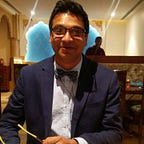Cognitive Dissonance might make you hate coffee!
Coffee is the ‘yuckiest’ drink!
Ever felt confused or uncomfortable when you hold two conflicting views, like, let’s say, “I love coffee!” and “Coffee will eventually kill you!” (this is absolutely a hypothetical statement made for the purpose of this post. There is no scientific evidence that concretely proves or disproves the effects of coffee on health. I personally love coffee and dread at the thought of not drinking it ever. So, please don’t stop drinking coffee after reading this!)
I had a friend who loved coffee and used to drink over 5 grandes a day. And every time he drank a cuppa, he would think to himself, “this is doing no good for your body buddy!” (5 cuppas are obviously not good for anyone’s health) Nevertheless, he continued until the day he was diagnosed for hypertension (that clinical name for the problem of high blood pressure) and was asked to stop coffee drinking once and for all. Given the choice to live a healthier life or drink, he chose the former. I don’t know what he said to himself every morning, afternoon and evening to control himself, but whatever he said, worked. He didn’t touch a cup of coffee since (it’s been two years).
But the interesting thing about this friend is that when we meet up in a cafe and I order my grande Americano, he cringes his brows and says, “how do you drink that? It’s so fucking bitter!”
I am assuming that’s what he told himself over and over again to convince himself to stop drinking. And now believes it so much that, and I am guessing here, has forgotten how much he enjoyed the taste himself. His mind has completely re-written the circuits where he now strongly believes that coffee is perhaps the most ‘yuckiest’ drink in the world.
Cognitive Dissonance
Scientists dubbed this cognitive behavior as “Cognitive Dissonance”. It was actually called so by Leon Festinger, of University of Minnesota, in his 1956 book, When Prophecy Fails. For the previous two years he had infiltrated a cult group that believed that the world would end on December 20, 1954 in a massive flood. When nothing happened at midnight, their faith was strengthened based on another message received by their leader that they had been saved because of their stubborn belief and faith. According to the book, the leader of the group received a message from the aliens telling her, “The little group, sitting all night long, had spread so much light that God had saved the world from destruction.”
And so, this group went on to believe even more strongly that the prophecy was true and that apocalypse was predicted and that their faith was what stopped it from happening.
This may sound surprising to you, but it’s actually so common that there is a good odd that you have faced cognitive dissonance yourself. What about that expensive dress/suit you wanted to buy? Did you end up believing that it would have looked good, or fit you, or wasn’t worth the price tag?
“Aw, come one! 500 bucks! It’s not worth it!”
Well, it seemed worth it first, but then something in you changed your mind. This is cognitive dissonance at play.
Nothing new about it
Though Festinger may have coined the term — Cognitive Dissonance, the concept of such a bias existing was known to man for ages before 1956. Aesop, the 6th century B.C fablist, had captured this beautifully in his story — The Fox and The Sour Grapes! Where the fox tries and tries to eat the grapes of the vine, but then eventually gives up saying, “Oh, they looked sour anyway!”
Does it really matter?
Well, in a way, cognitive dissonance does, at least in my view and experience, no more harm than just merely changing your perception and beliefs. It doesn’t make a difference to my friend or me or anyone else for that matter, if he thinks coffee is the ‘yuckiest’ drink. He’s free to his opinion.
But the problem is that opinions cause judgments that in-turn govern decision and action. Not drinking coffee would be fine, but what if he stopped me or his wife or went on a campaign to have coffee banned (I would have personally shot him if he had been successful at that!).
What about religious opinions that get strengthened because of cognitive dissonance? It is by no means harmless, when a man shoots a bunch of commuters in a bus or children in a school because ‘god’ told him so. Or when a group of religious fanatics terrorize others, go on killing sprees and try to cleanse the world of bad blood. All these are extreme cases of cognitive dissonance at work.
Here’s more on Cognitive Dissonance, Leon Festinger and the Prophecy that failed — The Psychology of Conspiracy Theories, Jonah Lehrer/wired.com
Originally published on January 23rd, 2013
If you like this archived post, please clap or share it with others if you think they’ll enjoy reading this.
Futred/In Workshops LLP was a training company I used to run a few years back. It no longer is operational and neither is the site.
